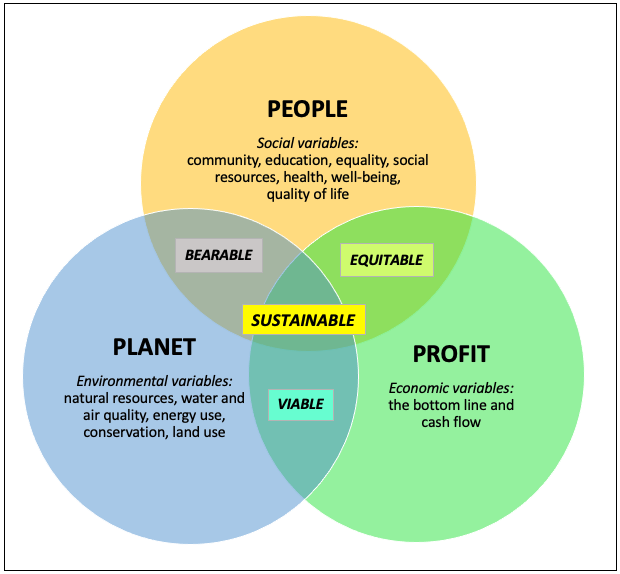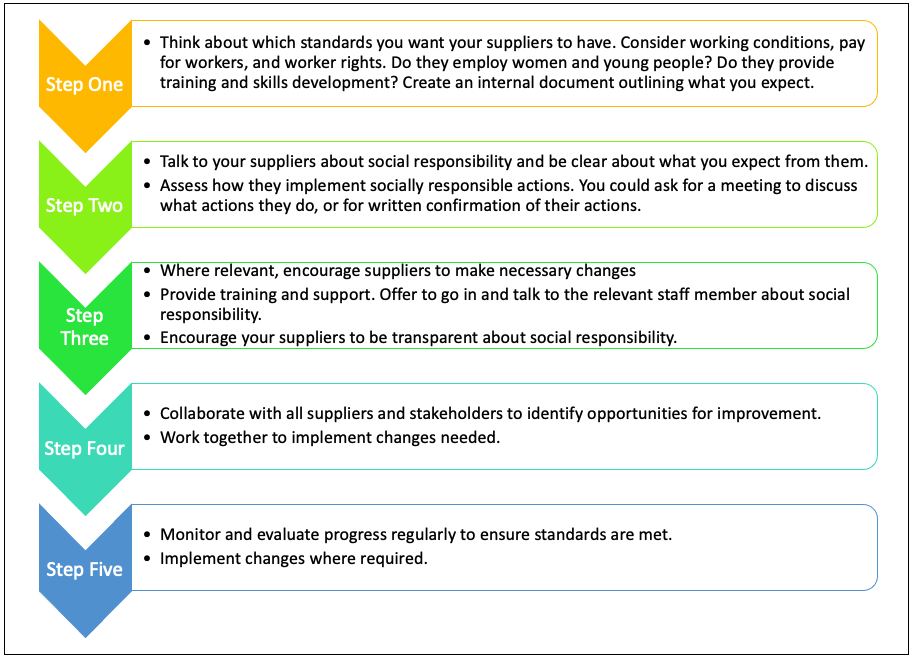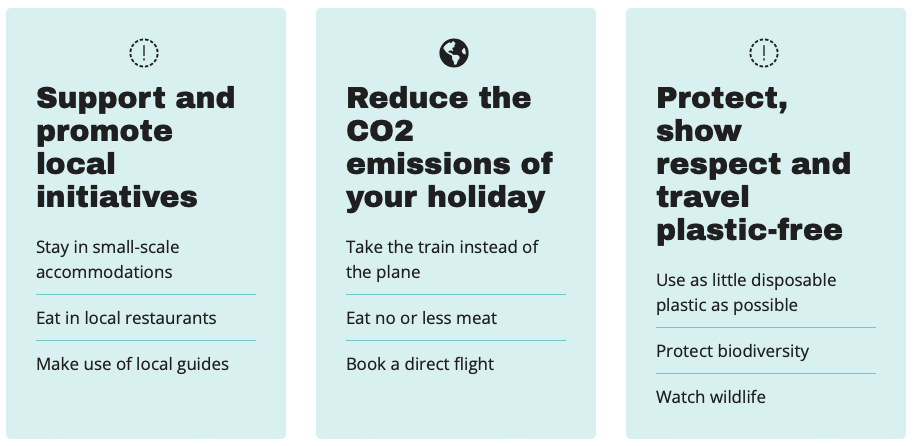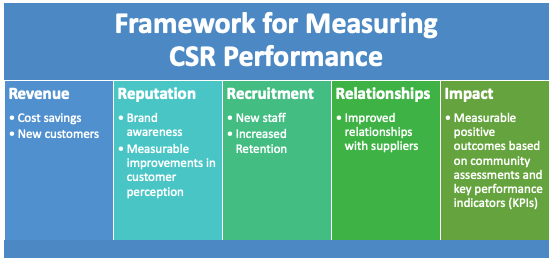
9 tips on how to become more socially responsible in the tourism sector
Social responsibility is about individuals and businesses acting in the best interests of society and the environment, and balancing those actions with profitability. It has become a very important way to assess the success of companies and can lead to a more efficient business, enhanced reputation and satisfied workforce. Read on to find out how to measure your social responsibility, conduct regular assessments and develop your own corporate social responsibility policy.
Contents of this page
- Identify the opportunities for becoming more socially responsible in tourism
- Ensure a safe and healthy workplace
- Ensure diversity and social inclusion
- Treat your staff fairly to build loyalty
- Manage your human rights due diligence process
- Implement social responsibility throughout the supply chain
- Create your own CSR policy
- Measure your CSR activities
- Implement CSR standards and certification
What is social responsibility?
Social responsibility is when businesses work in the best interests of the environment and society, and not only with the aim of profitability. In practice, this means they balance economic growth and profitability with the welfare of people and places. Social responsibility in business is often known as corporate social responsibility (CSR).
Social responsibility involves all stakeholders that are part of the business. Stakeholders are all the different groups of people connected with your organisation, including employees, customers, suppliers, local communities, investors and any other businesses you work with.
Another way of looking at CSR is to think about ‘People, Planet, Profit’ as the driving force of social responsibility. This concept, known as the ‘triple bottom line’, can be helpful for businesses to understand CSR. When a business operates according to the triple bottom line, it is committed to measuring its performance in three ways that make it a sustainable business:
- Social and environmental impact
- Implementing sustainability
- Profitability
Figure 1: The ‘triple bottom line’ of corporate social responsibility

Source: Acorn Tourism Consulting
Some of the most common socially responsible activities that businesses commit to include:
- Improving working conditions
- Participating in fair trade
- Implementing diversity, equality and inclusion
- Making charitable donations
- Volunteering
- Implementing corporate policies that benefit the environment
- Investing in socially and environmentally responsible funds/organisations
- Reducing their carbon footprint
Corporate social responsibility (CSR) and going green are closely related. Both include actions relating to sustainable management of the environment and fair practices in the workplace. You should consult the CBI studies on both topics as you develop your business to be fully sustainable.
1. Identify the opportunities for becoming more socially responsible in tourism
Social responsibility can have major benefits for your business if you manage activities well. These benefits include:
- Making your business more profitable
- Giving your business an advantage over competitors
- Building your reputation and image as an ethical supplier
- Increasing trust and satisfaction among your customers and employees
The tourism sector is in a unique position to play a direct role in making life better for people. Done properly, social responsibility can:
- Foster equality
- Embrace people’s individuality and differences
- Improve people’s long term mental health and wellbeing
- Improve people’s quality of life
Social responsibility is especially important to the youngest consumer groups, made up of millennials/Gen Y (born between 1980 and 1995, now aged between 27 and 42) and Gen Z (born after 1996, now aged up to 26). They are concerned with big issues like climate change, equality and diversity, and sustainable travel. Professionally, they want to work for companies that are socially responsible. To reach them and attract them as customers, your business policies must meet their needs.
Tip:
- Use your sustainable and responsible actions to help develop your USP (unique selling point). Your USP guides your marketing strategy to appeal to customers and will help you stand out in a crowded marketplace.
2. Ensure a safe and healthy workplace
A safe and healthy workplace is essential for the wellbeing of your employees and the success of your business. Good health and safety conditions will lead to higher productivity and less time taken off work due to illness. Below are steps you should take to ensure a high level of safety and good health protocols:
- Carry out a risk assessment: identify potential workplace hazards and think about the risks associated with them. If you have an office, they could include unsecured electrical cables running across the floor, broken furniture, faulty electrical equipment and so on. Tour operators should consider aspects such as vehicle maintenance and equipment.
- Develop safety policies: these policies address hazards and the measures you will take to deal with them. Safety policies should also include guidelines for preventing staff accidents, injuries and illness.
- Provide safety training: all staff should know what to do in an emergency. An emergency could be anything from a fire to accidents such as a staff member falling. Include this in your safety policy.
- Promote good health and hygiene practices: post-Covid, robust health and hygiene practices remain important for your staff. Encourage regular handwashing and provide soap and hand sanitiser, and put up signs to remind your staff. Regularly clean workstations, shared equipment, kitchens and bathroom facilities, or employ a cleaner to do this for you.
- Encourage your staff to voice their concerns: make sure staff know who they can talk to about any health or safety concerns. Encourage them to speak freely, so they feel they can raise issues without worrying about being penalised or not believed.
- Monitor and evaluate: regularly review your safety procedures and implement any changes needed.
Best practice case studies
Msafiri Tours, Uganda
This local tour operator offers a range of alternative, affordable, ethical tours providing ‘more than just a safari’. They are keen to show people what Africa is really like by meeting people, discovering their cultures, spending time with locals and sharing stories and expertise. Their Responsible Travel policy clearly outlines three areas of responsibility – environmental, economic and social – and actions they take in each.
Fostering connections between communities and visitors is a good social responsibility action.
What can you learn?
- View the video on the home page to see how this operator puts social responsibility at the heart of its marketing message.
Experience Jordan, Jordan
Adventure operator Experience Jordan commits to providing experiences that help generate economic sustainability and better futures for communities in Jordan. Its Core Values express the operator’s commitment to social responsibility and mission to improve lives through adventure tourism. You can see the value that the operator places on a pro-active social responsibility policy.
In 2022, this operator was named a Travelife Partner in recognition of its long-term sustainability and CSR efforts.
What can you learn?
- Explore the Travelife certification programme and consider making the journey towards becoming certified as a sustainable tour operator.
Happy Trails Asia, Indonesia
This local operator takes a ‘360-degree approach’ to sustainability and responsible tourism across the three core elements of CSR: environment, economy and community. All of its tourism offers are billed as responsible, including accommodation, experiences, transport and tours, and the operator is also Travelife-certified. Collaboration across the supply chain ensures that all stakeholders work together. Happy Trails Asia is also a signatory of the Glasgow Declaration on Climate Action in Tourism.
Their CSR policy has a strong focus on the protection and education of children and on providing better living conditions for local communities.
Figure 2: Giving back – CSR

Source: Happy Trails Asia
What can you learn?
- Explore their CSR policy and see what you can adapt for yours.
- Make a public stand and sign up to the Glasgow Declaration on Climate Action Tourism.
Tip:
- Read this interesting blog on 6 steps to creating and maintaining a safe workplace for tips you can adapt in your office.
3. Ensure diversity and social inclusion
Diversity and social inclusion in the workplace are about empowering your staff by respecting what makes them different. These differences may be age, gender, ethnicity, religion, disability and/or sexual orientation. The benefits of a diverse workforce and positive social inclusion include higher profits, innovation, skills development through a diverse talent pool and higher employee retention.
Research shows that businesses with a diverse and inclusive culture enjoy far more trust as staff and customers expect to be treated fairly regardless of their race, gender, sexual orientation or age.
- Increase diversity: be more inclusive when hiring new staff. These days it is also important to be gender-aware. Creating an open-minded work atmosphere is a good step towards being inclusive.
- Ensure a safe working environment: this means an environment that is free from harassment and abuse. It is important that all staff know your business will not tolerate harassment and/or abuse of any kind.
- Create opportunities to employ women: consider what jobs could be done by women and actively recruit women for vacant posts.
- Create opportunities to employ young people: consider support jobs for school leavers and other young people just starting out in the workplace. They tend to be enthusiastic and energetic and may bring different perspectives to your business. They are also great at social media and could bring in new skills.
- Ensure your workplace and services are accessible: being socially responsible means you accommodate people of all abilities. State what facilities you have, such as ramps for wheelchair users and accessible toilet facilities, or braille signage. The European market is an ageing market, and the need for accessibility is increasing. If you are an accessible business, you will be better placed to understand the needs of European customers and able to meet them.
Tip:
- Read the CBI study What are the opportunities in the European market for accessible tourism? to learn more about making your business accessible.
4. Treat your staff fairly to build loyalty
If you treat your staff fairly, honestly and respectfully, they will be loyal to you and your business. If they have a high level of job satisfaction, they will be less likely to leave and seek employment elsewhere, possibly at one of your competitors.
These are the key factors to consider:
- Workers’ rights: you have to know what these are in your country. Workers’ rights include things like the right not to be discriminated on account of factors such as age, disability, race, religion and sexual orientation. Workers may also have statutory rights such as the entitlement to sick pay, maternity/paternity leave, holiday leave, redundancy pay and protection against unfair dismissal.
- Staff contracts: make sure your staff have employment contracts. Familiarise yourself with your country’s labour laws and employment contracts. Contracts should always include entitlements such as sick leave, holiday pay and maternity rights.
- Pay a fair wage: you must pay you staff a fair living wage so they can enjoy a decent standard of living, with access to opportunities and choices enabling them to be active members of society. Do an audit of your staff pay and compare it to other similar businesses.
- Invest in staff training and development: make sure your staff have the tools they need to do the jobs you want them to do. Developing specialist skills such as language or guide training, or teambuilding exercises to explore ideas, are good ways to make your staff feel involved in the business.
Tip:
- Encourage feedback and ideas from your staff. You could do an anonymous survey to find out what they actually think about their current working conditions.
5. Manage your human rights due diligence process
Human rights due diligence is how businesses identify and act upon actual and potential risks for people who are their employees, who work in their supply chain and who are affected by their actions, such as communities and travellers/customers. It is about identifying any human rights violations and eliminating the risk or actual occurrence of such violations.
The Universal Declaration of Human Rights was adopted in 1948 as a “common standard of achievement for all peoples and all nations”. Since then, it has led to more than 70 human rights treaties applied at global and regional levels. Human rights are further covered by the International Bill of Human Rights and two international covenants that shape human rights: the International Covenant on Economic Social and Cultural Rights (ICESCR) and the International Covenant on Civil and Political Rights (ICCPR).
The UN Guiding Principles on Business and Human Rights provide a set of guidelines for businesses to manage human rights due diligence with the objective of enhancing standards and practices with regard to business and human rights.
In tourism, human rights issues include accessibility, gender equality, protection of culture and traditions and protection of children. See the below examples of poor human rights practices in tourism. You can find additional useful examples in Management Guideline for Tour Operators, by the Roundtable Human Rights in Tourism.
| Discrimination |
|
The owner of a restaurant in the historic centre of a central European town has advertised a job opening for a server. She does not hire the best qualified applicant, who belongs to an ethnic minority, because visitors have complained about staff from this ethnic group in the past.
|
|
One human right affected here is:
Universal Declaration of Human Rights, Article 1: “All human beings are born free and equal in dignity and rights.” |
| Heavy loads |
|
Local tour operators at Mount Kilimanjaro use native porters. The porters run a high risk of permanent brain damage as tours are conducted at brief intervals with insufficient acclimatisation time. On top of this, tour operators pressure porters to carry more than the legally allowed maximum load.
|
|
Human rights affected here include:
Universal Declaration of Human Rights, Article 25 (1): “Everyone has the right to a standard of living adequate for the health and wellbeing of himself and of his family.”
|
| Obtrusive |
|
In an African region popular for safari tourism lives a population group famous for its wattle and daub dwellings. Their villages have turned into a tourist attraction. The locals have been forced to erect barbed wire fences to protect their privacy against the tourist intrusion.
|
|
One human right affected here is:
Universal Declaration of Human Rights, Article 12: “No one shall be subjected to arbitrary interference with his privacy, family, home…” |
Managing human rights due diligence is a business process that involves several steps:
- Identify and assess negative impacts on people.
- Prevent or stop the negative impacts and mitigate against them.
- Implement changes and review regularly.
- Communicate how impacts are addressed.
There are tools online to help you do this. The Roundtable Human Rights in Tourism is a German non-profit organisation that promotes the implementation of human rights due diligence by tourism companies. Members include a wide range of tourism organisations including the Association of British Travel Agents (ABTA), the Dutch Travel Association (ANVR), the German Travel Association (DRV), Travelife and TourCert, and several tour operators.
The organisation has tools and resources to support businesses to implement human rights due diligence, including Implementation Guidelines, the Get Started Tool and a Resource Center. Use the Get Started Tool to assess the risk of human rights violations in your own country. Be sure to follow the instructions carefully and also download the fictitious case studies following local tour operators in their learning process with the Get Started tool.
Tips:
- Download the UN Guiding Principles on Business and Human Rights so you are clear about what they involve.
- Study the Roundtable Human Rights in Tourism website and familiarise yourself with their tools and resources. Keep an eye out for new products they are launching in 2023, including the virtual and interactive global Destination Risk Map and the online publication ‘Responsible Tourism in Oppressive Regimes – a Guide for Tour Operators to Put People First’.
6. Implement social responsibility throughout the supply chain
Businesses that want to demonstrate their commitment to social responsibility must ensure the whole chain of supply follows the same principles. The tourism supply chain can be long and complex, particularly for large operators. For local tour operators the supply chain includes any business or person you use to provide a service, such as a taxi firm, equipment hire company, food provider, local tour guide, accommodation establishments, third-party excursion operators or other local operators you have a business relationship with.
The chart below shows steps you can take to implement social responsibility throughout your supply chain.
Figure 3: Steps to implement social responsibility in a tourism supply chain

Source: Acorn Tourism Consulting
Remember that if you are supplying European tour operators, your business is part of their supply chain. Therefore, they need to know that you are implementing social responsibility in your supply chain, because it directly impacts theirs. Evaneos has established a code of conduct to ensure that suppliers support local communities. It also gives preference to working with local operators that actively support local communities and protect the environment.
7. Create your own CSR policy
A CSR policy is a document that describes how a business commits to sustainable development, engages with stakeholders and behaves ethically. It is an important document that European tour operators will want to see to be assured of your commitment to social responsibility.
Think of a CSR policy as a way to self-regulate all your business activities across the whole supply chain. A CSR policy must consider all sustainable activities undertaken in three areas: social, environmental and economic responsibility.
Table 1: Elements of a corporate social responsibility Policy
| Social | Environmental | Economic |
|
|
|
Source: Acorn Tourism Consulting
Tour operators often publish their CSR policies on their websites. They may refer to them as a CSR policy, responsible travel policy or sustainability policy. The best way to prepare your own is to look at what other operators are doing and learn from them. Take a look at the following selection of best practice examples from European tour operators and local tour operators.
CSR policy case studies from Europe
- Better Places (Netherlands): uses some easy-to-read infographics to explain its sustainable travel policies, which also give customers simple guidance for travelling sustainably.
Figure 4: Making sustainable travel possible

Source: Better Places
- Chamäleon Reisen (Germany): has a very detailed overview of its sustainable travel policy on its website. As well as profiling all its actions and providing details of projects it supports, it also reports on progress it is making, which is useful to show customers.
Figure 5: Help in numbers

Source: Chamäleon Reisen
- Intrepid Travel (UK): provides very detailed information about how it is a responsible business in several areas: animal welfare, climate action, community-based tourism and diversity and inclusion. The operator was also one of the first travel companies to be certified by B-Corp, a certification programme focused on businesses’ social and environmental performance.
- Much Better Adventures (UK): has a clear USP and mission that is at the heart of its sustainability policy: to be the world’s most positive impact travel company. It is pursuing this through four main actions: supporting local communities, funding conservation, reducing carbon and campaigning with other organisations for action on urgent issues.
CSR policy case studies from developing countries
- Camino Travel (Costa Rica): Costa Rica was one of the first destinations to embrace ecotourism and most tour operators there have a strong sustainable travel ethos. Camino Travel’s sustainable travel policy is very detailed and lists its activities to promote sustainable tourism and the actions it expects its supply chain partners (hotels, tour providers, transport providers) to commit to. This includes addressing human rights issues, such as child exploitation, and implementing social responsibility.
- Gamewatchers Safaris (Kenya): this operator’s responsible tourism policy is largely focused on supporting communities and protecting the wildlife that are key attributes of many African destinations. It is committed to helping to preserve Africa’s wildlife and benefitting local communities near its eco-camps in carefully managed conservancies. This operator was also the winner of Africa’s Responsible Tourism Award in the World Travel Awards.
- Memphis Tours (Middle East): has a responsible travel statement clearly stating their policy aims and ethical business practices across the three main elements of economic, environmental and social responsibility.
- Siem Reaper (Cambodia): is a local operator in Siem Reap that provides tours in collaboration with local businesses and communities. Its mission centres on responsible tourism to benefit local people, the environment and youth development.
8. Measure your CSR activities
To find out if your actions are having a positive impact, you need to measure them. Measuring your social responsibility activities is the key to success. It helps if you set SMART (specific, measurable, attainable, relevant and time-bound) goals:
- Specific – goals must be clear and defined. Use plain language and do not make vague statements.
- Measurable – you must be able to measure your goals in all phases so you can accurately report progress to stakeholders.
- Attainable – make sure the goals you set can be achieved, so you can indeed have a positive impact on the environment.
- Relevant – make sure the goals you set are relevant to your business and align with your values.
- Time-bound – measure your activities in a timely manner. Make a schedule and stick to it.
You can create a useful framework to measure CSR impacts by breaking your activities down into separate areas. Below is an example.
Figure 6: Framework for measuring CSR performance

Source: Acorn Tourism Consulting
9. Implement CSR standards and certification
Use ISO guidance to establish best practices
The ISO 26000 Guidance on Social Responsibility published by the International Standards Organisation (ISO) outlines international recommendations for making businesses more socially responsible. Its purpose is to help businesses to develop a long-term, sustainable social responsibility strategy targeting environmental policy, sustainable development and communities. The standard was developed around seven underlying principles and seven core subjects and issues, as detailed in the table below.
Table 2: Principles and core subjects and issues of social responsibility
| Seven key underlying principles of social responsibility | Seven core subjects and issues pertaining to social responsibility |
|
Accountability Transparency Ethical behaviour Respect for stakeholder interests Respect for the rule of law Respect for international norms of behaviour Respect for human rights |
Organisational governance Human rights Labour practices The environment Fair operating practices Consumer issues Community involvement and development |
Source: ISO
The guidance also emphasises the importance of measuring activities, publishing results and implementing improvements. The ISO standard helps businesses both to fully understand what is legally required in a social responsibility policy and to establish initiatives beyond these requirements.
What is sustainability certification?
Being sustainably certified as a tourism business is a powerful message to your buyers. It tells them that you understand the negative impacts of tourism and are working to maximise positive impacts. Being sustainably certified is part of being a socially responsible business.
There are more than 200 certification programmes worldwide for sustainable tourism, so local tour operators have a wide range of choices. You will have to research which scheme best suits your needs. Take a look at the ECTAA (European Travel Agents’ and Tour Operators’ Associations) toolbox for travel agents and tour operators, which lists some of the most relevant schemes for tour operators.
The DestiNet Portal is a European networking portal to promote sustainable and responsible tourism. Its Certification Quickfinder has a range of filters (including business type, country/region of operation, operational level and so on) to help you find schemes operating in your field and region.
Schemes that offer good value for local tour operators and other tourism businesses in developing countries include:
- Travelife for tour operators is one of the best-known sustainable tourism certification programmes and is widely used by European buyers. It is based on the GSTC (Global Sustainable Tourism Council) standards and two ISO standards: ISO 26000 (see above) and ISO 14001, which is concerned with Environmental Management.
- TourCert is expanding to countries all over the world, currently especially in Latin America. The website is available in English, German and Spanish. It offers a range of sustainability e-learning and online courses at reasonable rates.
- Fair Trade Tourism is a certification scheme for tourism businesses in southern Africa. It is a not-for-profit organisation that works in partnership with Travelife. Fair Trade Tourism certification also gives particular weight to protecting human rights through fair trade. The standard is published online for free, so download it to study the criteria.
- Good Travel Seal offers sustainability certification and a sustainability support programme developed specifically for small and medium businesses. It also publishes its criteria online for free.
Tips:
- Purchase the ISO 26000 Guidance on Social Responsibility to help inform your policy. Even if you decide not to progress with sustainability certification, you should embed a high level of social responsibility in your business.
- Download the GSTC criteria and familiarise yourself with the requirements to become certified.
- For details on other sustainability certification programmes, read the CBI report How to be a sustainable tourism business.
This study was carried out on behalf of CBI by Acorn Tourism Consulting Limited.
Please review our market information disclaimer.
Search
Enter search terms to find market research

